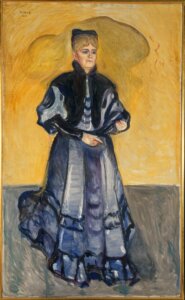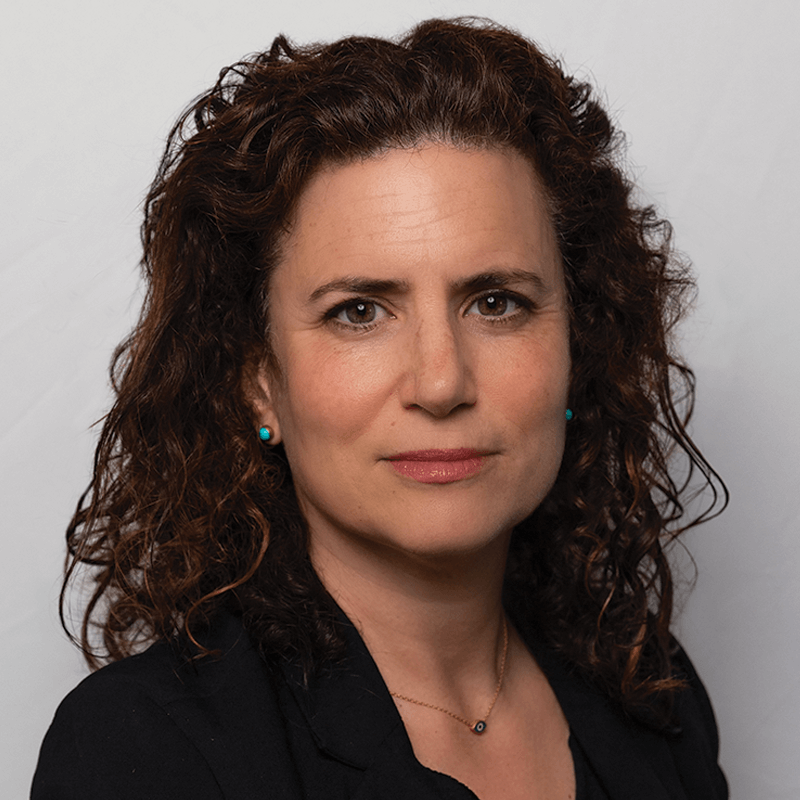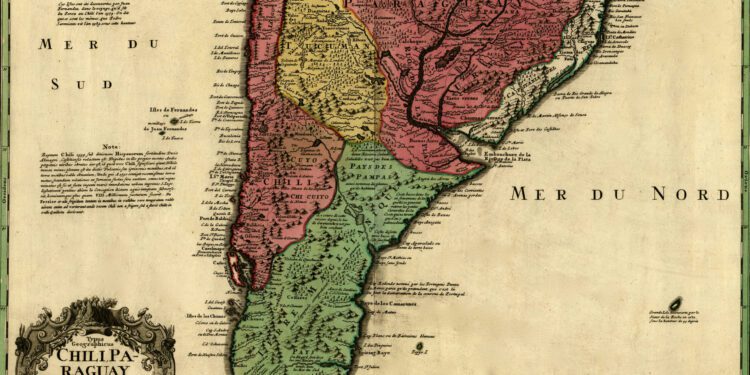The southern countries of South America. Photo by Getty Images

By Benjamin Ivry
August 14, 2024
A country without Jews is like blintzes without sour cream. That’s the conclusion one draws from People and Identities in Nueva Germania, a  new book by anthropologist Jonatan Kurzwelly about a 19th Century model for a Jew-free world.
Nueva Germania, a district in Paraguay, was formed as a German settlement in 1887 by teacher and antisemitic activist Bernhard Förster and his wife, Elisabeth Förster-Nietzsche, sister of the philosopher. Their goal was to create an area of Germanic development far from the influence of European Jews.
Still extant in different form, the colony was so ultra-German that it was even rumored to have sheltered the notorious Nazi war criminal Dr. Josef Mengele after the Second World War, although historians maintain that this is improbable.

The whole idea derived from that source of Jew-hatred, the composer Richard Wagner, with whom the Försters socialized at Bayreuth. Wagner advocated launching a vegetarian community in South America, where the German spirit could flourish untrammeled by Jews, who were decried by Förster as a “parasite on the German body.”
Förster had tried to suppress what he saw as disastrous emigration into Germany of Jews from East Europe. He organized a petition addressed to Chancellor Otto von Bismarck to warn about the spread of Jewishness, pleading for a ban, or reduction, on further Jewish immigration. He also suggested forbidding all Jews from attaining any positions of political power.
 Elisabeth Förster-Nietzsche in a portrait by Munch. Photo by Wikimedia Commons
Elisabeth Förster-Nietzsche in a portrait by Munch. Photo by Wikimedia Commons
Germany’s university students emphatically supported Förster’s proposals with hundreds of thousands of signatures approving of such concepts. Förster’s actual encounters with Jews appear to have been few, apart from one vague scuffle with an unnamed Jewish man in a Berlin tram, about which no precise details have been preserved.
Rather than live in a Germany where Jews could be encountered on public transport, Förster announced that he preferred to leave German Jews “to die alone in their own vanity.” Notably, philosopher Friedrich Nietzsche, who had already broken with Wagner over the latter’s anti-Jewish writings, was not a fan of Förster’s views.
Nietzsche wrote to Elisabeth in 1887 after his sister informed him that an antisemitic article had been published citing his philosophical fiction Thus Spoke Zarathustra.
“Those damned dirty antisemitic morons should stay away from my ideals!! I have already suffered so much because our family name is mixed up with this [anti-Jewish] movement through your marriage! Over the last six years you have lost all reason and all thoughtfulness.”
Nietzsche followed up with a missive, informing Elisabeth that, if Förster’s plan failed, he would “rejoice in the failure of an [antisemitic] enterprise and pity you all the more that you have bound yourself to such a cause out of duty and love.”
The philosopher considered that the one bright side of the whole mishegas was that “as a result, antisemites will be compelled to leave Germany.”
As if teasing his sister, he added that he increasingly wished that the Jews would “come to power” in Europe, so that they would no longer have to assert themselves as an oppressed, disadvantaged minority. In a sardonic aside, Nietzsche noted that any German who considered himself better than a Jew simply because he was a Christian, was either a figure to be ridiculed or belonged “in a madhouse.”
Nietzsche would elaborate on these impressions in his philosophic works such as Beyond Good and Evil, which denounces “the anti-Jewish stupidity” of Germans, while praising Jews as “without a doubt the strongest, purest, most tenacious race living in Europe today. They know how to thrive in even the worst conditions.”
Indeed, Nietzsche went as far as to say that Jews could control Europe if they wanted to, but they obviously had no desire to do so. Could the philosopher have been thinking of his brother-in-law’s colony when he added that for Jews to be assimilated into Europe, as they wished to be, it might be “practical and appropriate to throw the antisemitic hooligans out” of Germany?
Elisabeth was unpersuaded by her brother’s rhetoric, and wrote to their mother to express her disappointment. She argued that her husband Förster only sought to “make people better and happier.” She was confident that one day her husband would be “praised as one of the best German men and benefactors.”
Förster duly bought cheap land on credit and moved to Paraguay with a dozen families of like-minded Germans. Förster had chosen the country as it was an impoverished land not “infected with Jewishness.” He had not foreseen that the hot, humid climate, malaria, parasites, and snakes would be unpleasant for urban German colonizers.
Farming was unproductive, debts increased, and the Försters were forced to sell some of their furniture and other possessions, although their standard of living was still better than that of fellow German pioneers. Finally, Förster died in a hotel room after ingesting alcohol, morphine and strychnine; there was some debate over whether his death was accidental or intentional.
By 1893, Elisabeth Förster-Nietzsche had returned to Europe, where she helped tend to her by-then-ailing brother. Kurzwelly reports that while Nueva Germania endured, its existence became intertwined with legends about its origins as an antisemitic utopia.
Historians have squabbled over the extent to which Förster-Nietzsche became a Nazi and tried to Nazify her brother’s work retroactively. She was certainly a German nationalist and antisemite, but never officially joined the Nazi Party.
Her biographer Carol Diethe claims that Förster-Nietzsche was merely an opportunistic, intermittent Jew-hater who saw saw antisemitism as a way to acquire personal status and prestige for herself and her late brother. But an earlier biographer, Ben Macintyre, asserted that Förster-Nietzsche wholeheartedly consented to the posthumous Nazification of her brother’s works.
When Hitler came to power in 1933, the Nietzsche Archive received financial support from the government, and Förster-Nietzsche’s funeral in 1935 was attended by a weeping Hitler and other high-ranking Nazis.
Yet Jonatan Kurzwelly dismisses as “gossip” the notion that Josef Mengele, who had performed deadly experiments on prisoners at the Auschwitz concentration camp, possibly hid in the colony in the 1950s. “Several elderly people” in Nueva Germania “tell stories about” an unnamed Nazi war criminal who stayed in the town for a few months after the war, but Kurzwelly was “unable to determine [the Nazi’s] identity.”
He cites a current resident that instead of viewing Nueva Germania as the first proto-Nazi racist experiment, it would be preferable for it to be seen as the “first failed proto-Nazi experiment.”
Nowadays, ethnic concerns have diminished, and descendants of a German Jew, Max Stern, who reportedly moved to Nueva Germania after falling in love with an Aryan woman whose family had moved there, live together in harmony with their neighbors. Supposedly Max Stern was discreet about his Jewish roots until so much time had passed that few, if any, Nueva Germanians appeared to care anymore.
The lesson from Kurzwelly’s book may be that Jew hatred, like all human emotions, eventually dissipates over the years. This is a distinctly more optimistic conclusion than the portrait of Nueva Germania described three decades ago by the journalist Ben Macintyre, who criticized its denizens, the offspring of Teutonic antisemites, as the product of “interbreeding to the point of genetic deterioration.”
Â
Benjamin Ivry is a frequent Forward contributor.

I hope you appreciated this article. Before you go, I’d like to ask you to please support the Forward’s award-winning, nonprofit journalism during this critical time.
Now more than ever, American Jews need independent news they can trust, with reporting driven by truth, not ideology. We serve you, not any ideological agenda.
At a time when other newsrooms are closing or cutting back, the Forward has removed its paywall and invested additional resources to report on the ground from Israel and around the U.S. on the impact of the war, rising antisemitism and the protests on college campuses.
Readers like you make it all possible. Support our work by becoming a Forward Member and connect with our journalism and your community.
—  Rachel Fishman Feddersen, Publisher and CEO
Join our mission to tell the Jewish story fully and fairly.
Source link : http://www.bing.com/news/apiclick.aspx?ref=FexRss&aid=&tid=66bcee3833f141d89c038f9e787079b0&url=https%3A%2F%2Fforward.com%2Fculture%2F644076%2Fnueva-germania-forster-nietzsche-jonatan-kurzwelly%2F&c=7247378163994651606&mkt=en-us
Author :
Publish date : 2024-08-13 13:00:00
Copyright for syndicated content belongs to the linked Source.












